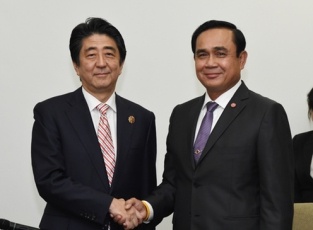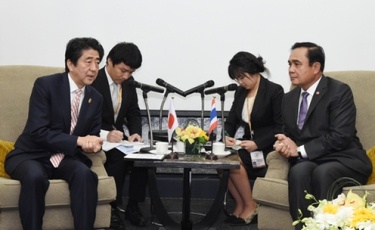Japan-Thailand Relations
Japan-Thailand Summit Meeting
November 20, 2015
 Photo: Cabinet Public Relations Office
Photo: Cabinet Public Relations Office
 Photo: Cabinet Public Relations Office
Photo: Cabinet Public Relations Office
On November 20, commencing at 5:05 p.m. for approximately 30 minutes, Mr. Shinzo Abe, Prime Minister, held a meeting with H.E. General Prayut Chan-o-cha, Prime Minister of the Kingdom of Thailand, in Kuala Lumpur, Malaysia, during his visit to attend the Association of Southeast Asian Nations (ASEAN)-related summit meetings. The overview of the meeting is as follows.
- 1 Opening remarks
- 2 Bilateral relations
- 3 Regional affairs and cooperation in the international arena
1 Opening remarks
At the beginning, Prime Minister Prayut commented that he is pleased to be able to meet again. In response, Prime Minister Abe conveyed his condolences to the victims of the bombing incident that occurred in Bangkok in August, explained that the international community should unite in resolutely denouncing the acts of terrorism that occurred in Paris, and stated that he intends to coordinate closely with the international community including Thailand.
Prime Minister Abe welcomed the various progresses under the "Strategic Partnership," including infrastructure development such as railways, earth observation satellites and information and communication technology (ICT), and explained that he hopes to further strengthen the cooperative relationship between Japan and Thailand. In response, Prime Minister Prayut said he is happy that cooperation between Japan and Thailand is taking shape, and explained that he intends to have H.E. Dr. Somkid Jatusripitak, Deputy Prime Minister, discuss economic relations when the Deputy Prime Minister visits Japan this month. In regard to terrorism, Prime Minister Prayut stated that he intends to cooperate with Japan and the international community, and supports Prime Minister Abe's Proactive Contribution to Peace policy.
Prime Minister Abe welcomed the various progresses under the "Strategic Partnership," including infrastructure development such as railways, earth observation satellites and information and communication technology (ICT), and explained that he hopes to further strengthen the cooperative relationship between Japan and Thailand. In response, Prime Minister Prayut said he is happy that cooperation between Japan and Thailand is taking shape, and explained that he intends to have H.E. Dr. Somkid Jatusripitak, Deputy Prime Minister, discuss economic relations when the Deputy Prime Minister visits Japan this month. In regard to terrorism, Prime Minister Prayut stated that he intends to cooperate with Japan and the international community, and supports Prime Minister Abe's Proactive Contribution to Peace policy.
2 Bilateral relations
Prime Minister Abe explained that he is doing his utmost to expedite the verification procedure for two additional mango varieties, as requested by Prime Minister Prayut. Prime Minister Abe also stated that consideration is being given to the prompt realization of investment in the Special Purpose Vehicle for the Dawei development project, and explained that surveys related to a road from the Thailand border to Dawei are scheduled to be completed in January next year, JICA experts are also being utilized, and Japan intends to participate in a full-fledged manner. In response, Prime Minister Prayut expressed his gratitude, explained that the Thai-side promptly considers lifting restrictions on Japanese beef and mandarin oranges, and stated that he believes the partnership with Japan will lead to success, and Japan's participation in the Dawei development project is important.
Furthermore, Prime Minister Abe noted that when Deputy Prime Minister Somkid visits Japan in the latter half of this month, high-level economic dialogues will be held and discussions on important economic policies are scheduled to take place, and Japan intends to cooperate on human resources development and facilitating the upgrade of Thailand's industries, promote infrastructure cooperation through the "Partnership for Quality Infrastructure," and in particular hopes to contribute to Thailand's stable electric power supply by introducing IGCC (integrated gasification combined cycle), the most advanced coal-fired thermal power generation technology. Moreover, Prime Minster Abe expressed his thanks for Prime Minister Prayut's explanation on removing the age limit on beef produced by Japan, and commented that he feels encouraged to hear about the addition of production and export regions for Japanese citrus fruits.
Prime Minister Prayut conveyed his congratulations on the conclusion of the Trans-Pacific Partnership (TPP) negotiations and explained that Thailand is also interested in participating, and to that end, in addition to the provision of information, he requested further human resources cooperation in the automotive field. Prime Minister Abe replied that he welcomes Thailand's expression of interest in joining the TPP, and if Thailand is prepared to satisfy the high level of the TPP and participate in it, this will contribute significantly to the stability and prosperity of the region and Japan intends to cooperate. Prime Minister Abe said he also hopes to consider human resources cooperation.
Furthermore, Prime Minister Abe noted that when Deputy Prime Minister Somkid visits Japan in the latter half of this month, high-level economic dialogues will be held and discussions on important economic policies are scheduled to take place, and Japan intends to cooperate on human resources development and facilitating the upgrade of Thailand's industries, promote infrastructure cooperation through the "Partnership for Quality Infrastructure," and in particular hopes to contribute to Thailand's stable electric power supply by introducing IGCC (integrated gasification combined cycle), the most advanced coal-fired thermal power generation technology. Moreover, Prime Minster Abe expressed his thanks for Prime Minister Prayut's explanation on removing the age limit on beef produced by Japan, and commented that he feels encouraged to hear about the addition of production and export regions for Japanese citrus fruits.
Prime Minister Prayut conveyed his congratulations on the conclusion of the Trans-Pacific Partnership (TPP) negotiations and explained that Thailand is also interested in participating, and to that end, in addition to the provision of information, he requested further human resources cooperation in the automotive field. Prime Minister Abe replied that he welcomes Thailand's expression of interest in joining the TPP, and if Thailand is prepared to satisfy the high level of the TPP and participate in it, this will contribute significantly to the stability and prosperity of the region and Japan intends to cooperate. Prime Minister Abe said he also hopes to consider human resources cooperation.
3 Regional affairs and cooperation in the international arena
Prime Minister Abe reiterated his gratitude for Thailand's support for "Proactive Contribution to Peace," explained that ensuring stability in the South China Sea is extremely important for regional peace and prosperity, and said Japan has been appealing for a peaceful resolution based on the rule of law, which is of great interest to Japan. Prime Minister Abe expressed the view that unilaterally changing the status quo will heighten regional tension and so is deeply concerning. In response, Prime Minster Prayut voiced support for the Government of Japan's position regarding the South China Sea and North Korea, highly appreciated Prime Minister Abe's leadership on the occasion of the successful Japan-China-Republic of Korea Trilateral Summit Meeting, and stated that the South China Sea issue should be resolved peacefully in a format that conforms to international principles.

